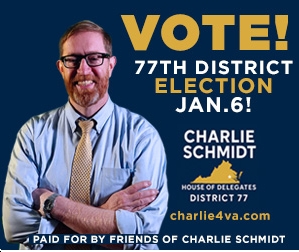From Clean Virginia:
Legislators advance substantial energy reforms; fail to progress long overdue campaign finance bills
Suite of bipartisan utility reform bills head to Governor Youngkin’s desk
RICHMOND, VA – Critical reforms passed during the 2024 General Assembly session bring Virginia closer to a regulatory environment optimized for 21st century energy challenges. Most notable, the bipartisan passage of House Joint Resolution 30 (Delegate Sullivan (D – Fairfax) and Delegate Ware (R – Powhatan)) and Senate Joint Resolution 47 (Senate Majority Leader Surovell (D – Fairfax) and Senator Suetterlein (R – Roanoke City)) authorizes the State Corporation Commission (SCC) to study options for aligning electric utilities’ financial incentives with the public interest using performance-based and other alternative regulatory tools.
“Virginia is joining dozens of other states around the country that are taking common sense steps to align utility incentives with the public interest,” said Clean Virginia Executive Director Brennan Gilmore. “Meeting modern-day energy challenges means compensating utilities for how they perform, not for how much they build or how much electricity they sell. Properly implemented performance-based regulation can be a win-win for utilities, customers and the environment.”
Legislators from both parties successfully introduced a number of other reforms to advance clean, affordable energy and protect Virginians from utility shutoffs in times of crisis:
- Sponsored by Sen. Aird (D – Henrico) and Del. Shin (D – Fairfax) and chief co-patrons Del. Hernandez (D – Norfolk City), Del. McClure (D – Arlington) and Del. Reaser (D – Loudoun), SB 480 and HB 906 established vital safeguards for Virginians facing utility shutoffs in extreme weather and states of emergency. Del. Helmer’s (D – Fairfax) HB 275 expanded protections to keep the lights on for customers with serious medical conditions.
- Senate Majority Leader Surovell, Sen. Deeds (D – Albemarle), Del. Sullivan and Del. Shin successfully passed legislation to expand access to shared solar programs in Dominion Energy’s territory (SB 253 and HB 106) and establish a program for Appalachian Power Company customers (SB 255 and HB 108).
- The SAVE Act, introduced by Sen. Deeds and Del. Webert (R – Fauquier) with chief co-patrons Del. Lopez (D – Arlington), Del. Shin and Del. Sullivan will modernize how utilities’ energy efficiency programs are evaluated, ensuring better programs to decrease energy usage and lower electric bills for Virginia families (SB 565 and HB 746).
In contrast, utilities fought hard to shift an even higher financial burden to ratepayers with the passage of Del. O’Quinn’s (R – Washington) HB 1491 and Sen. Marsden’s (D – Fairfax) SB 454. These bills could force early project costs for small modular nuclear reactors onto ratepayers rather than shareholders, increasing electric bills with no guarantee of projects ever coming online.
Following the legislative session, the Commission on Electric Utility Regulation will review a number of important energy reforms left on the table this legislative session, including legislation to prohibit monopoly utilities from recovering political expenses from customers’ electric bills (HB 792) introduced by Del. Henson (D – Prince William County) and a bipartisan bill from Del. Rasoul (D – Roanoke City) and Del. McNamara (R – Roanoke County) to calculate the full amount of federal funding electric utilities could use to invest in clean energy and lower customers’ bills (HB 809).
There was no significant progress on campaign finance reform during this year’s session.“Corporate influence continues to play a deeply entrenched role in the legislature, illustrated clearly by the failure of good governance reforms this session,” continued Gilmore. “A number of bills designed to restore the public’s trust in government languished without committee assignments or votes, leaving Virginians to wonder for yet another year who their legislators represent.”
For the tenth year in a row, legislators failed to advance a bipartisan ban on the personal use of campaign funds sponsored by Sen. Boysko (D – Fairfax) with chief co-patron Sen. Carroll Foy (D – Prince William County) and Del. Simon (D – Fairfax) with chief co-patrons Del. Cherry (R – Chesterfield), Del. Convirs-Fowler (D – Virginia Beach) and Del. Helmer (SB 377 and HB 40). However, Del. Torian (D – Prince William County) stated a shared commitment with House Speaker Scott (D – Portsmouth) to ban the personal use of campaign funds in 2025.
Despite support from a growing number of stakeholders, a bill from Del. Bulova (D – Fairfax) with chief co-patron Del. Helmer to cap campaign contributions (HB 874) did not receive a hearing and bills from Sen. Roem (D – Prince William County) and Del. Cole (D – Stafford) preventing public utilities from donating to the legislators responsible for regulating them was left in the Senate Finance and Appropriations Committee and without a motion in the House (SB 326 and HB 190).
###
Clean Virginia is a 501(c)4 independent advocacy organization with an associated Political Action Committee, Clean Virginia Fund. Clean Virginia works to fight corruption in Virginia politics in order to promote clean and affordable energy. We are motivated by the core belief that our democracy should serve everyday Virginians over special interests.














